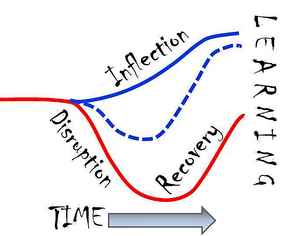
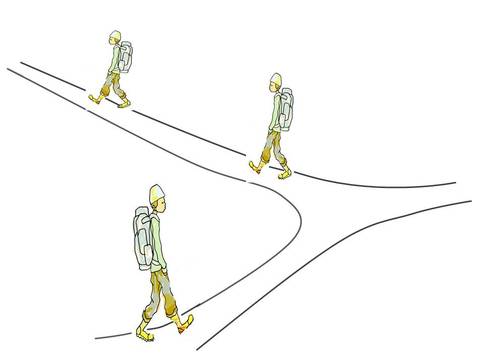
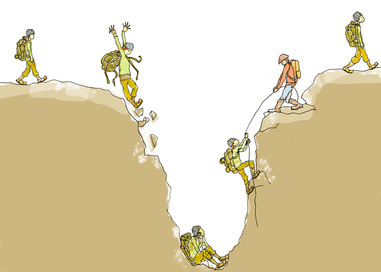
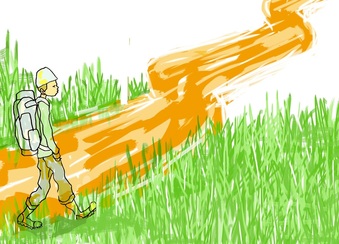
Like most people, I have experienced many more inflections in my life than disruptions. I came up with a list of 14 inflection points and 4 significant disruptions.
Inflection points occurred three times during my secondary schooling and on each occasion there was a circumstance in which a teacher believed in me sufficiently to give me a chance and help create opportunity for me which took me on a new pathway without feeling any sense of loss for the past. Inflection points in my life also determined my pathway to a PhD and to my first professional role and 8 years of living in Saudi Arabia. At a personal level, inflection points occurred when I met the first girl who I decided to marry, and also, after her untimely death at the age of 48, when I met and married my second wife and entered her family. Inflections also occurred as each of my children were born and we grew from a couple into a family since becoming a parent and caring for children has a significant impact on our experiences, identity and behaviours.
"Very few people see inflection points as the opportunities they often are: catalysts for changing their lives; moments when a person can modify the trajectory he or she is on and redirect it in a more desirable direction. Whether it's a new job, a change in a relationship, or something else, an inflection point is one of those periodic windows of opportunity when a person can pause, reflect, and ask: '... do I want to continue on this path or is now the moment to change direction?"(2)
It's hard to remember what you thought as a child, but now I think I did realise at the time (aged 12) when I was in my first inflection point, that I was at crossroads and that the decision I was making would alter the course of my life. I could see that there were opportunities for me to take although I could only appreciate the true significance of the change I made when I look back years later. As Soren Kierkgaard once said 'Life can only be understood backwards [after it has been] lived forwards'
Turning to the disruptions in my life I have experienced several of my own making. The first occurred when my family and I left Saudi Arabia and I gave up a job I enjoyed, many good friends and a lifestyle we had grown accustomed to come back to a period of great uncertainty. The second, when I was 40, and I fundamentally changed my career. The first 12 months were the hardest of my professional life. I had to give up being the professional geologist I had invested heavily in becoming and there were enormous feelings of loss alongside the stress, uncertainty and at times exhaustion I was experiencing. But the biggest disruption I have so far had to cope with was the loss of my first wife to cancer in 1999. When she died, a significant part of me died with her and I know that I became a different person to the person I was when she was alive. While outwardly it might have looked as if I had coped well with my loss, I mostly kept how I felt to myself. I lost my enthusiasm for life for a while and within a few months I had decided to move on to another role in another organisation - I think, in part, to escape the past.
Looking back now, I can now see how all these inflection points and disruptions were the triggers for new pathways and experiences through life. Many of these points required me to go through a transition that was not enjoyable or comfortable and was sometimes full of anxiety and stress. All of them changed me to varying degrees and in various ways. All required me to learn, develop and change as a person. Many required me to develop myself professionally for new roles and to relinquish an identity and begin to form a new identity.
THE IDEA OF LOSING YOURSELF
As I was completing this post I came across a post by Maria Popova (3) on Rebecca Solnit's book A Field Guide to Getting Lost (4). Maria tells a story in which a student came into a workshop with a quote from what she said was the pre-Socratic philosopher Meno. It read, “How will you go about finding that thing the nature of which is totally unknown to you?” The idea of using disruptions and inflection points in life to discover how to 'go about finding that thing, the nature of which is totally unknown to you', seemed like a revelation to me.
Solnit writes (4): 'To lose yourself: a voluptuous surrender, lost in your arms, lost to the world, utterly immersed in what is present so that its surroundings fade away.' As Popova elaborates,'to be lost is to be fully present, and to be fully present is to be capable of being in uncertainty and mystery. And one does not get lost but loses oneself, with the implication that it is a conscious choice, a chosen surrender, a psychic state achievable through geography. That thing the nature of which is totally unknown to you is usually what you need to find, and finding it is a matter of getting lost.' This beautifully expressed way of seeing the process of embarking on a new trajectory through life, seems to offer a deeper insight into the psychological process of life inflections and self-disruptions, by revealing why we are motivated to do it. By changing the direction of our life. By voluntarily putting ourselves into new situations that will take us on a different path through the landscape that we have access to in our life - we are creating opportunity to lose something of ourselves (the life we used to lead and the person we used to be) while at the same time creating the potential to discover, 'that thing, the nature of which is totally unknown to you'. Losing ourselves is the way we challenge ourselves to live a life in which we can discover for ourselves who we are. 'Never to get lost is not to live' (Popova).
NEW OPPORTUNITIES FOR CREATIVITY
It seems to me that inflections with all the promise they hold, are also important points for creativity as we have to recreate ourselves and develop entirely new ecologies for learning and flourishing in response to the changing circumstances of our life. On the other hand disruptions are often periods when creativity may die within us as our desire to flourish is overwhelmed by our sense of loss and dislocation, and creativity serves only to help us survive, not flourish.
I conclude that the points of inflection and disruption in our life enable us to discover who we are at each stage and in each part of our life and they exert a profound influence on who we become. They are largely responsible for our uniquely personal learning and development trajectories and our accomplishments in the contexts we have inhabited. They demand and require us to develop our resilience and afford us new opportunities to exercise our creativity in both recreating ourselves and solving the problems and dilemmas of new circumstances in our life.
Sources
1) Exploring Disruption and Resilience Lifewide Magazine December 2014
2) Taking Advantage of Life’s (Few and Far Between) Inflection Points Howard's Gift: Uncommon Wisdom to Inspire Your Life's Work, By Eric C. Sinoway http://hbswk.hbs.edu/item/7041.html
3) Maria Popova (2014) A Field Guide to Getting Lost: Rebecca Solnit on How We Find Ourselves
4) Rebecca Solnit (2006) A Field Guide to Getting Lost: Rebecca Solnit on How We Find Ourselves
Illustrations by Kiboko HachiYon
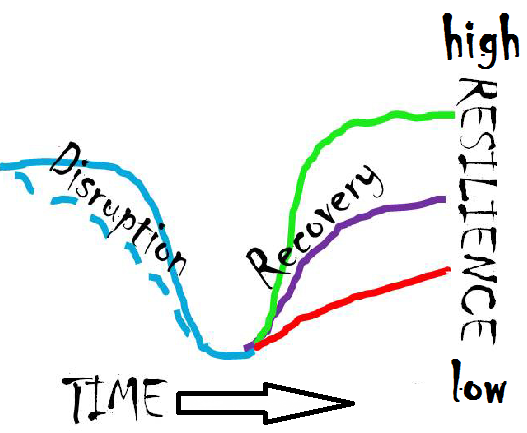
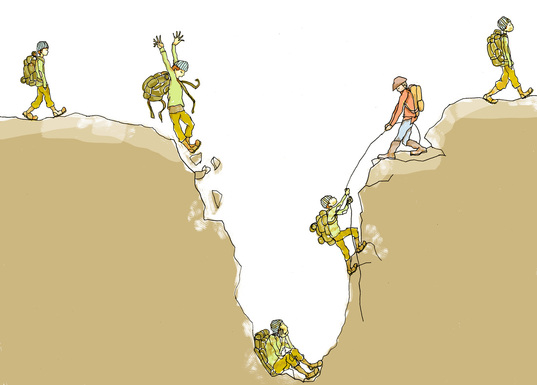
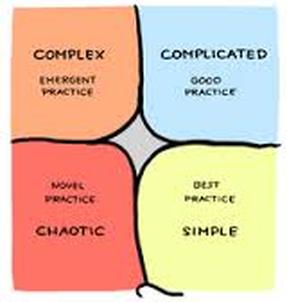
 RSS Feed
RSS Feed
